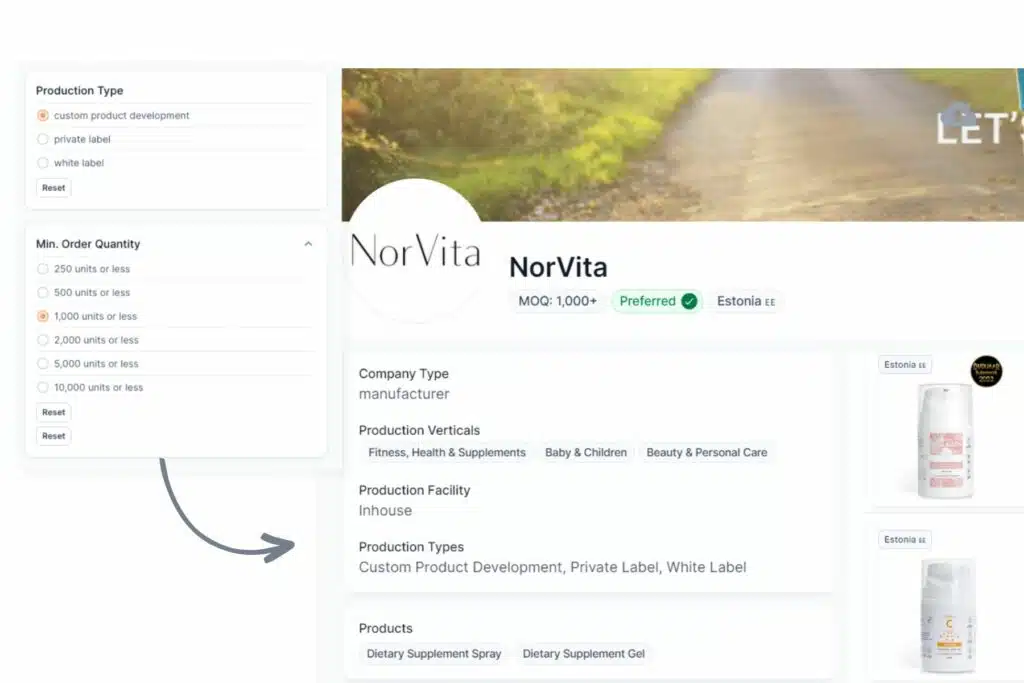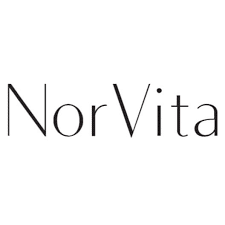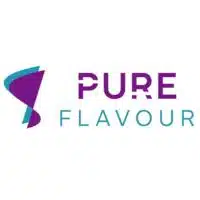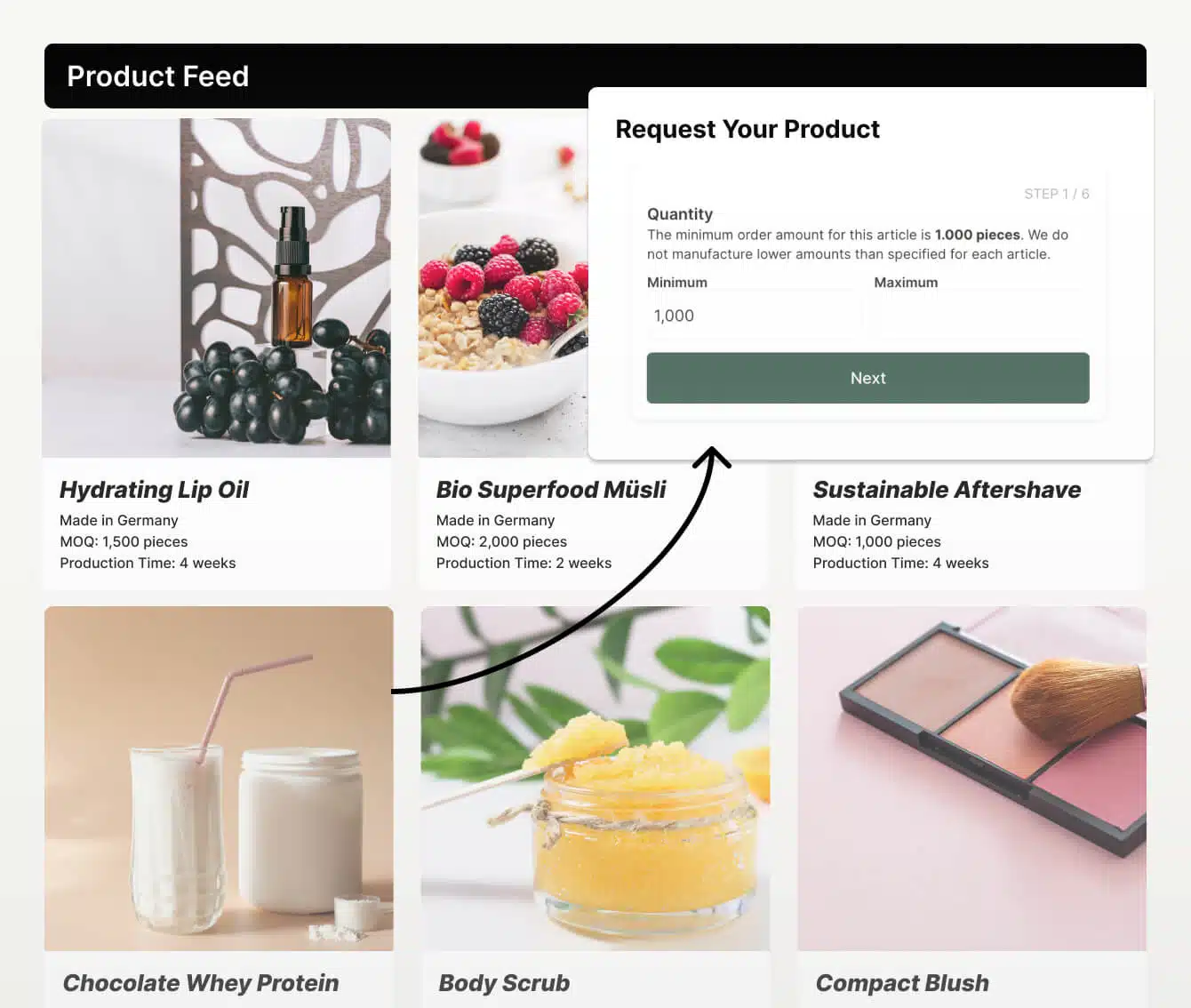20.000+ Private Label Manufacturers at your Fingertips
Best private label supplements manufacturers for your brand

Product Categories
Production Types
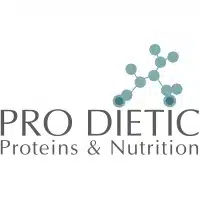
Powder-based supplements manufacturer from France - Private label, contract manufacturing for your brand.
Product Categories
Production Types
5+ Reasons to source your private label supplements with Wonnda
1. Fully digital sourcing solution for private label supplements
Harness the power of private label supplements with Wonnda, the leading digital B2B one-stop platform designed to streamline and simplify the process of creating your own supplement brand. Leveraging our wide network of trusted private label manufacturers and suppliers, and cutting-edge digital tools, we guide you every step of the way, allowing you to focus on growing your business.
2. High quality ingredients for private label supplements
At the heart of every successful supplement brand are high-quality ingredients. Our network of private label supplements suppliers work with the best raw materials, ensuring that your products are potent, pure, and safe. It’s our commitment to quality that sets Wonnda apart in the private label supplements sector.
3. Private label or white label supplements – or custom product development
Wonnda understands that each business has unique needs. That’s why we offer both private label and white label supplement options. Whether you want to launch a completely customized product or prefer to market a proven formulation under your own brand, we have you covered.
4. 90% of our private label supplement manufacturers are located in Europe
Quality is our watchword, and this is reflected in our choice of suppliers. A staggering 90% of our partners are based in Europe, a region renowned for high manufacturing standards and stringent regulations. When you source your private label supplements through Wonnda, you’re not just creating a product; you’re ensuring a legacy of quality.
5. The right packaging for your private label supplements – Wonnda got you covered
A great product deserves great packaging. At Wonnda, we go beyond supplement production by connecting you with an array of packaging suppliers. Whether you’re after a minimalist design or an avant-garde presentation, we make sure your private label supplements stand out on the shelves with branded packaging.
6. Startup, brand, creator or retailer – we have your use case covered
Wonnda is for anyone who dares to dream of their own supplement brand. Whether you’re a start-up eager to break into the wellness market, an established brand looking to expand your supplement product line, a creator with a devoted following, or a big retailer in need of private label supplements, Wonnda is your partner in making those dreams a reality.
Frequently asked questions
What are private label supplements?
Private label supplements are dietary and nutritional products produced by a manufacturer but branded and sold under a different company’s brand. The company that orders the supplements can then sell them as their own, often at a significantly marked-up price. This model allows businesses to develop their brand without the need for investing in production facilities or raw material sourcing.
Can I customize private label supplements?
Absolutely. One of the major advantages of private labeling is the level of customization it offers. Businesses can specify the ingredients, formulation, packaging design, and even label design to suit their brand and target market. Wonnda partners with private label supplement manufacturers & suppliers, who can adapt their existing products to your needs.
Please note that those adaptions can lead to higher minimum order quantities. If you want to have lower minimum order quantities you may consider white label options or ready-made formulas from the manufacturer.
No matter if you opt for private label or white label, Wonnda has the right private label supplements manufacturer for you. In both cases this means you can create a supplement product that is unique to your brand, giving you an edge in the market.
What are minimum order quantities for private label supplements?
Minimum order quantities, or MOQs, vary widely among supplement manufacturers.
On Wonnda you can get started with white label supplements with a quantity of 100 units or less. However, the more customization you want, the higher the minimum quantities get.
Some manufacturers may require orders of several thousand units for a single product, while others might be more flexible and offer lower MOQs.
It’s important to negotiate and understand these terms before choosing a manufacturer. At Wonnda, we strive to connect you with suppliers that match your business needs, whether you’re a startup or an established brand. When you sign up to our platform, you can access thousands of products and see their minimum order quantities.
What is the difference between private label and white label supplements?
While both private label and white label supplements are manufactured by a third-party and sold under a different brand, the key difference lies in customization. With white label products, the product formulation is typically standardized and the same product can be sold by multiple brands with only the brand label changing. On the other hand, private label supplements allow for unique customization in terms of ingredients, formulation, and packaging, offering a product that is exclusive to your brand.
What kind of products can be produced under private label?
A wide variety of products can be produced under private label, especially in the supplements sector. This includes vitamins, probiotics, protein powders, workout nutrition supplements, herbal supplements, and much more. The private label model gives you the freedom to tap into trending wellness markets or cater to niche dietary needs, thereby offering you the opportunity to serve a diverse range of customers while building your unique brand identity.
Where are the private label supplements manufactured?
The majority of our partner manufacturers for private label supplements are based in Europe, renowned for their high-quality standards and stringent regulations. By choosing to work with manufacturers in this region, you can ensure that your supplements are produced to meet superior quality and safety benchmarks. Once you sign up with Wonnda, you can transparently see where the products are produced and who the manufacturers are. This gives you more control over your supply chain and helps build trust with your customers, as they can be assured of the origin and quality of your products.
What certifications do the private label supplement manufacturers hold?
Our suppliers are held to high industry standards and hold various globally recognized certifications, including GMP (Good Manufacturing Practice), ISO 9001 (Quality Management), ISO 22000 (Food Safety Management), HACCP (Hazard Analysis Critical Control Point), and Organic Certifications.
Many also hold specific certifications for dietary supplements like NSF for Sport, which assures that products do not contain any substances banned by major athletic organizations.
At Wonnda, we ensure that every supplier in our network is thoroughly vetted. We verify their certifications and perform comprehensive quality checks to assure that they can deliver the highest quality products to our clients. This ensures not only the quality of the product but also the adherence to legal and safety regulations in the industry, allowing your brand to build a strong, trust-based relationship with your customers.






